Marc Weidenbaum's Blog, page 38
December 5, 2024
Disquiet Junto Project 0675: Arc of the Drone
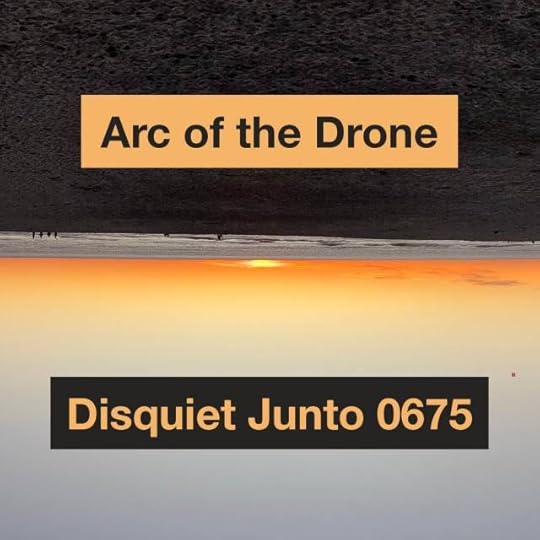
Each Thursday in the Disquiet Junto music community, a new compositional challenge is set before the group’s members, who then have five days to record and upload a track in response to the project instructions.
Membership in the Junto is open: just join and participate. (A SoundCloud account is helpful but not required.) There’s no pressure to do every project. The Junto is weekly so that you know it’s there, every Thursday through Monday, when your time and interest align.
Tracks are added to the SoundCloud playlist for the duration of the project. Additional (non-SoundCloud) tracks also generally appear in the lllllll.co discussion thread.
Disquiet Junto Project 0675: Arc of the Drone
The Assignment: Record a drone that goes from simple to complex to simple.
Step 1: You may, yourself, be experienced recording drone music, or you may never have recorded any. You may not even be sure what drone music is, in which case read up a bit. Not matter your experience and familiarity, please give some thought as to what constitutes drone music.
Step 2: Now think about what makes a drone simple and what makes a drone complex.
Step 3: Now record a piece of drone music that begins simple, gets complex, and then gets simple again. And note: The simple drone at the end needn’t necessarily be the same sort of drone with which the piece opens.
Tasks Upon Completion:
Label: Include “disquiet0675” (no spaces/quotes) in the name of your track.
Upload: Post your track to a public account (SoundCloud preferred but by no means required). It’s best to focus on one track, but if you post more than one, clarify which is the “main” rendition.
Share: Post your track and a description/explanation at https://llllllll.co/t/disquiet-junto-project-0675-arc-of-the-drone/
Discuss: Listen to and comment on the other tracks.
Additional Details:
Length: The length is up to you. How long is your arc?
Deadline: Monday, December 9, 2024, 11:59pm (that is: just before midnight) wherever you are.
About: https://disquiet.com/junto/
Newsletter: https://juntoletter.disquiet.com/
License: It’s preferred (but not required) to set your track as downloadable and allowing for attributed remixing (i.e., an attribution Creative Commons license).
Please Include When Posting Your Track:
More on the 675th weekly Disquiet Junto project, Arc of the Drone — The Assignment: Record a drone that goes from simple to complex to simple — at https://disquiet.com/0675/
December 4, 2024
Ambient Tea Party
I believe that this Ambient Tea Party, on the YouTube channel Den Pat, took place in Saint Petersburg, Russia, as that is where the associated Bandcamp page is based. Den Pat is, I think, the Denis Vladimirovich Patrabaev (or Патрабаева Дениса Владимировича — thanks, online translation tool!) listed in the label’s description as its founder. This solo set, which I listened to on repeat while working, is a treat, an admirably consistent, nearly hour-long mix of modulated tones and gently abrasive intrusions. Highly recommended. I’ll be working through the label’s catalog shortly.
December 3, 2024
My Favorite Albums of 2024
I voted in this year’s Pitchfork “best albums of 2024” list (and The Wire’s), and was asked to hold off on publishing my personal list until the full Pitchfork list went up on their website, which it now has, and the issue of The Wire with their look back came out today, too. (The Wire does a cool thing when listing the contributors to the voting: they list each contributor’s #1 album of the year.) So, here are my favorites. I have friends and colleagues who actively refine and adjust their lists of the best albums over the course of the given year, and even continue to do so, revising years and decades as time passes. I am, quite simply, not one of those people. Were I not asked to make a list, I would likely not. But I was, and I have, and I recognize these lists are very useful to people, so I share here happily. These are 25 records I enjoyed (or: appreciated, admired, got lost in) the heck out of this year:
Bill Frisell/Andrew Cyrille/Kit Downes: Breaking the Shell (Red Hook Records)Jeff Parker / ETA Vtet: The Way Out of Easy (International Anthem / Nonesuch)KMRU: Natur (Touch)The Necks: Bleed (Northern Spy Records)Taylor Dupree: Sti.ll (Greyfade)Sarah Davachi: The Head as Form’d in the Crier’s Choir (Late Music)Dialect: Atlas Of Green (Rvng Intl.)Lia Kohl: Normal Sounds (Moon Glyph)Prefuse 73: New Strategies for Modern Crime (Lex Records)Eiko Ishibashi: Evil Does Not Exist (Drag City)Dirty Three: Love Changes Everything (Drag City)Eli Keszler: Live 2 (LuckyMe)Christopher Bissonnette: In a Second Floor Window (12k)Seefeel: Everything Squared (Warp)Kali Malone: All Life Long (Ideologic Organ)Trent Reznor / Atticus Ross: Challengers (Original Score) (Milan)FourColor: Lightscape (12k)Max Richter: In a Landscape (Decca)Tristan Perich & Ensemble 0: Open Symmetry (Erased Tapes)Michael A. Muller: Mirror Music (Deutsche Grammophon)Kenneth Kirschner: Three Cellos (Greyfade)Patricia Wolf: The Secret Lives of Birds (Nite Hive’)Nonkeen: All Good? (Leiter)Adam Wiltzie: Eleven Fugues for Sodium Pentothal (Kranky)Zimoun: Dust Resonance (Room40)December 2, 2024
Back at It with Hannes Pasqualini
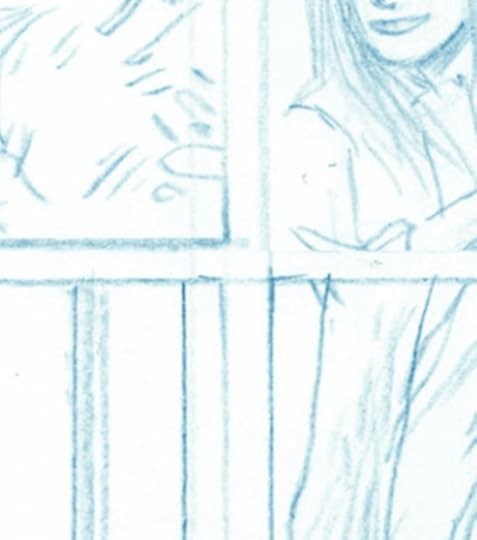
During the first year of the pandemic, Hannes Pasqualini illustrated and I wrote a half dozen four-panel comics: “Foghorns” (March 18, 2020), “Megaphone” (April 6, 2020), “Mentors” (April 13, 2020), “Eavesdrop” (June 15, 2020), “Room Tone” (March 25, 2020), and “Mnemonic” (October 5, 2020). Doing so was a highlight of that dreadful and stressful year. I’m happy to report that we are back at it, and I hope to have a new comic to share soon, and others soon after that. (The above image is a tiny detail of a work-in-progress.)
Meanwhile, Hannes, who is based in Northern Italy, is also at work on some solo material, and here, with permission, is a peek at what he is up to. You can follow his always interesting activities at instagram.com/hannes_pasqualini_illustrator. If you make music with synthesizers, then you may have used modules Hannes worked on, such as those from Mutable Instruments.
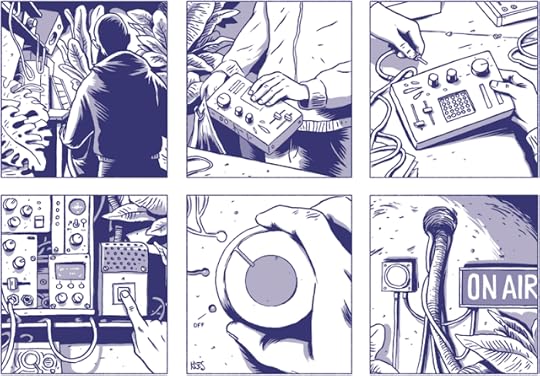
Communities in Code
I initiated a digital semi-break starting on the Friday before (American) Thanksgiving, but then this nifty tool, izzzzi.net, popped up, and I made a brief exception — not a breach, not a betrayal, just a matter of curiosity leading the way. The flourishing of code that encourages community amid a community in which software is a core component — well, that is a very specific place where my head (which is to say: my writing) happens to be at right now (alternative firmware, reciprocal repositories, gardens of forks), so the public announcement of izzzzi was especially well-timed for the current resting state of my receptors. I’m digging izzzzi plenty, both conceptually and practically. I’m not totally offline at the moment, but I have muted much of my digital social life for the remainder of 2024, with izzzzi now included in that self-imposed pause. I’ll be back at it sometime during the first week or so of 2025.
December 1, 2024
On Repeat: Hanlon, Lula, Kjartansson, Beat
On Sundays I try to at least quickly note some of my favorite listening from the week prior — things I’ll later regret having not written about in more depth, so better to share here briefly than not at all.
▰ Backwaters is an excellent collection of experiments that Christopher Hanlon recorded “over the last year or so.” The emphasis is largely on the ambient and atmospheric, which is to say the emphasis is on a lack of emphasis.
▰ I mentioned this album a couple weeks back in a different context, and when only one pre-release track was available. Now all of Chloe Lula’s deeply reverberant Oneiris — which combines her techno and cello experiences into something that is quite different from merely those two elements amalgamated — is out, and it’s dramatic, rich, and just plain fantastic.
▰ I have no idea how long this video will remain online, but on the YouTube account of a James Lee there is a complete take of Ragnar Kjartansson’s The Visitors, all nine screens edited into one compelling rendition. Lee has put the nine screens as insets shaped like an L — that’s 5 down, 5 across, with Kjartansson in his bathtub at vertices’ intersection. And then in the space that L frames, there are alternately one or two details from the overall performance given more space. For some reason the video embed isn’t working, so go to the video’s YouTube page to check it out.
▰ I really enjoyed the Beat tour when I caught it a couple weeks ago in San Jose (that’s Adrian Belew, Tony Levin, Steve Vai, and Danny Carey doing songs from King Crimson‘s legendary mid-’80s trio of records: Discipline, Beat, and Three of a Perfect Pair). The evening’s second set was when the band sounded less like a recital and more like a thoroughly engaged ensemble, and it opened with this great arrangement of “Waiting Man,” from the Crimson album that gave the tour its name. This video was recorded back in mid-September. Levin has a long-running photo album on his own website, and if you know what I look like, you can find me a few rows back stage right in some of his shots of the concert I attended.
November 30, 2024
Scratch Pad: Semi-Offline Edition
At the end of each week, I usually collate a lightly edited collection of recent comments I’ve made on social media, which I think of as my public scratch pad. I find knowing I’ll revisit my posts to be a positive and mellowing influence on my social media activity. I mostly hang out on Mastodon (at post.lurk.org/@disquiet), and I’m also trying out a few others. And I generally take weekends off social media. In fact, currently I’m off social media entirely (and I’m off a lot of other digital social venues, as well, including several Slacks, several email discussion lists, several Discourses, etc.), and that will remain the case until the first week or so of January. So, what follows are some notes I made for myself — a digital social network of one — from the past week:
▰ I was glad to see there’s now a Wikipedia page for “th1 [evnslower],” one of the “new” tracks on the “expanded edition” of Aphex Twin’s classic Selected Ambient Works Volume II. The track was online for nearly a decade before the collection came out, and yet when the expanded edition was announced, the track was routinely and repeatedly referred to as if it was new — not necessarily new in the sense of newly recorded, but new as in newly available, which wasn’t actually the case.
▰ We put on some random YouTube extended mixtape of swing music in the background while cooking, and a guest noticed that the accompanying images — which were clearly AI-generated: all burn-victim hands, glitching limbs, unusable objects — featured domestic settings that oddly matched the words of the songs. So, I Shazam’d a song, and it didn’t appear to exist. I Shazam’d the next, and the one after that. They didn’t appear to exist, either. I came to recognize that these weren’t songs, per se. They were weird repetitions of snatches of verbiage and riffs that gave the sense of songs. This was all fake swing jazz accompanied by fake nostalgic images. It was the opposite of ambient music, in that the more you paid attention, the less rewarding it got.
▰ Saturday marks the anniversary of Fernando Pessoa’s death on November 30, 1935, at the age of 47. Pessoa was born on June 13, 1888. I was 30 years of age when I purchased the URL disquiet.com, which I selected as an homage to his classic work, The Book of Disquiet (in the original Portuguese: Livro do Desassossego). I’m now 11 years older than Pessoa was when he died. In two weeks, on December 13, 2024, it will be the 28th anniversary of my obtaining the URL disquiet.com. (As someone who has been writing a lot of fiction, I sometimes wonder about Desassossego less as a purposeful collection of fragments and more the work of a fledgling novelist who couldn’t sort out how the accumulated parts might fit together. Which is to say, in this reading of Pessoa’s legacy, he has for me gone from observational role model to imagined cautionary tale.)
▰ There’s an interesting new slow social tool spun out by the folks behind llllllll.co, the latter of which is the primary music-related BBS I participate in (llllllll.co, which goes by Lines, is simply a Discourse instance). This new tool is named izzzzi.net, and it’s a pretty fascinating concept. Each day you can see, just for that day, the single post made by anyone whom you follow and who follows you (that’s a narrow Venn diagram overlap, and it gets narrower when you consider the mechanics of the inherent interaction). Ironically, I’m off social media until the first week of January, so while I gave it a one-day test-drive, I won’t dive in until early 2025. If you’re intrigued by izzzzi.net, there are some details at the personal website of one of its developers, also a founder of llllllll.co, Brian Crabtree: nnnnnnnn.co. One tidbit: “we live in an age where it is very difficult to imagine joining yet another thing. and it is really difficult to explain how something might be fundamentally different.” Another: “it’s become a sort of collaborative daily newspaper written by friends. on the surface the parameters feel antithetical: it’s ephemeral, it only changes daily, hardly anyone sees it. this is precisely what makes it interesting.”
▰ And speaking of Lines, someone there proposed a dedicated recommendations page for blogs, and located in the concept a parallel to the “now” page, which I have read about on occasion but never implemented. I replied, in part, about this /recommendations concept:
It’s sort of the inverse of a linktr.ee — that is, it’s a bunch of links or subjects, but ones that aren’t actually your own work or about you (the links go out rather than in; it’s “that, that, that” instead of “me, me, me”).
I don’t, per se, have a /recommendations page on disquiet.com. What I do have is a list of “Current Favorite Listens” in the upper right corner of the site’s main page template, and I usually list 3 items there, and I update the list occasionally. That list appears on, essentially, every page of the website as a result of the template. I will think about a more dedicated /recommendations page, along the lines of what you describe.
Also, I’ve never introduced a /now page, myself, but I have thought on occasion of doing so. I think before I did a dedicated /now page, I’d likely append a list of current activities to my /about page, which is currently just a professional bio. That may suffice for me.
▰ I finished reading two books this week, both non-fiction, both best-sellers, both by friends, and both — I was touched to realize at the end of each — listing me in the thanks sections: MCU: The Reign of Marvel Studios, by the trio of Joanna Robinson, Dave Gonzales, and Gavin Edwards, and Heartbreak Is the National Anthem: How Taylor Swift Reinvented Pop Music, by Rob Sheffield. I attended college with both Gavin and Rob. The books tell somewhat similar stories, as it turns out, albeit in different ways (the MCU one being a detailed journalistic timeline, the Swift book being very much the individual author’s ecstatic point of view). Both books are about global pop cultural phenomena that try to strike a balance between rabid fans who are deep in the lore and then the casual fans (the latter being what Rob humorously calls “normal people”) who dip in occasionally. The whole “Taylor’s Version” thing, in which Swift rerecorded her earlier albums, even has a taste of Marvel’s multiverse and What If? stories to it.
Strange Weather
By 12:40pm on November 22, 2024, I had posted the digital social life equivalent of out-of-office messages on my various social media accounts and several conceptually adjacent venues. At 12:44pm, my mobile phone erupted in a shrill, bristling alarm: the message announced was a flash flood warning for our area. Not to tempt fate, but given that I live near the top of a very tall hill, I had a sense that we were safe (tl;dr: we were), but the irony of the short time that passed between “I will stop, for a month or so, publicly tracking on social media the role of sound in my life” and “The city is using sound to get my attention for reasons of life, limb, and potential property damage” was not lost on me.
The next morning I curled up on on the couch and watched a bunch of movies, among them a recent disaster flick, Twisters. At some point late in the film, a feckless couple refuses to believe that a massive example of the title subject is headed their way. One of them gestures near an ear, so as to say, “See, there’s no tornado siren, ergo there is no tornado.” What the person doesn’t know, and we — the audience — do, is that the sirens were, just minutes earlier, themselves wiped off the face of the planet by the rapidly growing storm. The couple and their car soon meet the same fate.
November 29, 2024
Photogenic
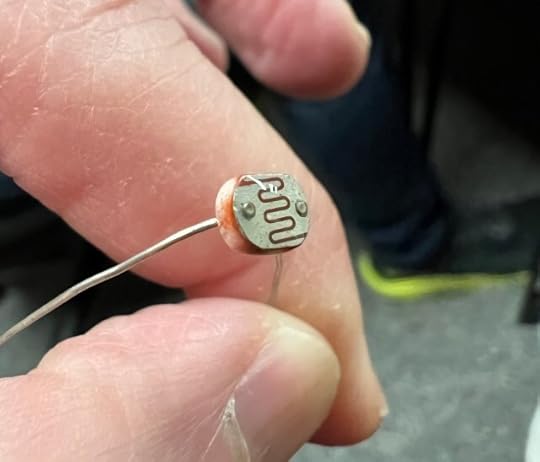
This photosensitive bit of electronics is my favorite item from this past weekend’s excursion into breadboarding. And yes, I should moisturize my hands more often.
November 28, 2024
Disquiet Junto Project 0674: Cerberus Sample
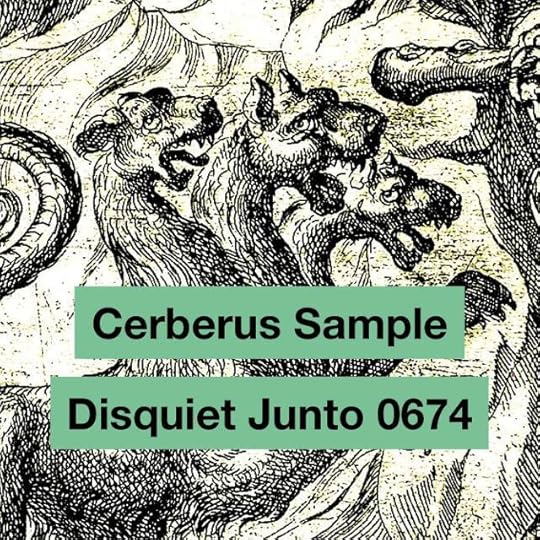
Each Thursday in the Disquiet Junto music community, a new compositional challenge is set before the group’s members, who then have five days to record and upload a track in response to the project instructions.
Membership in the Junto is open: just join and participate. (A SoundCloud account is helpful but not required.) There’s no pressure to do every project. The Junto is weekly so that you know it’s there, every Thursday through Monday, when your time and interest align.
Tracks are added to the SoundCloud playlist for the duration of the project. Additional (non-SoundCloud) tracks also generally appear in the lllllll.co discussion thread.
Disquiet Junto Project 0674: Cerberus Sample
The Assignment: Make a song not just with but from just one sample.
Step 1: You’re going to make a song with just one short sample as its entire sonic source material. Select your sample wisely.
Step 2: Make a song in which the sample you selected in Step 1 serves as the raw resource for all the different parts of the song. Use nothing but that solitary sample. Here is one example of a song with four parts: melody, backing chordal material, bass, and beat. Three parts may be best, but make as complex and busy a piece of music as you desire, certainly.
Tasks Upon Completion:
Label: Include “disquiet0674” (no spaces/quotes) in the name of your track.
Upload: Post your track to a public account (SoundCloud preferred but by no means required). It’s best to focus on one track, but if you post more than one, clarify which is the “main” rendition.
Share: Post your track and a description/explanation at https://llllllll.co/t/disquiet-junto-project-0674-cerberus-sample/
Discuss: Listen to and comment on the other tracks.
Additional Details:
Length: The length is up to you.
Deadline: Monday, December 2, 2024, 11:59pm (that is: just before midnight) wherever you are.
About: https://disquiet.com/junto/
Newsletter: https://juntoletter.disquiet.com/
License: It’s preferred (but not required) to set your track as downloadable and allowing for attributed remixing (i.e., an attribution Creative Commons license).
Please Include When Posting Your Track:
More on the 674th weekly Disquiet Junto project, Cerberus Sample — The Assignment: Make a song not just with but from just one sample — at https://disquiet.com/0674/



